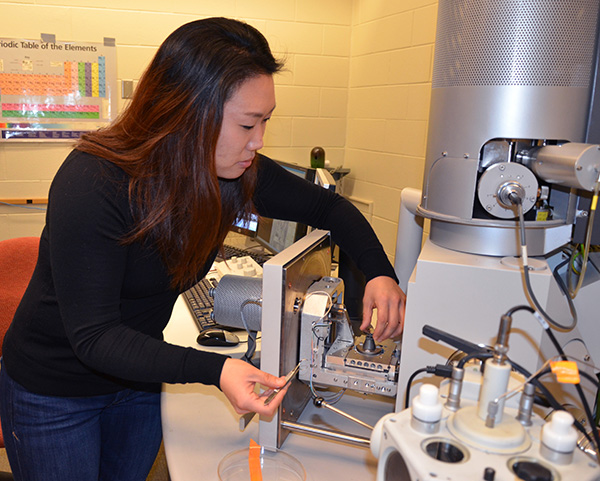Haesoo Moon began her PhD program at the Weldon School of Biomedical Engineering in 2018. Her research base is in the Laboratory of Implantable Microsystems Research. "Our lab focuses on implantable neurological devices, from glaucoma drainage implants to sensors to detect the initial effects of traumatic spinal cord injury," Haesoo says. "The world has a lot of ideas for things that we can implant in the body, but [the devices] don't last very long; that's where the problem is." Her current engineering challenge is to make such devices less susceptible to damage, such as bacteria or proteins that stick to their surfaces. She is fascinated with future technology to treat and prevent human disease and is energized by the collaborations between engineers and others to extend the lives of patients and the devices that serve them.
Her previous excellence in research as an undergraduate at the University of Missouri - Columbia and as a research intern at the Johns Hopkins School of Medicine helped her secure two prestigious fellowships to begin her investigations into the translation of implanted devices. Her interest in improved fabrication could lead to safer and longer-lasting implantation procedures in the hospital, fitting for the Innovation for Clinical Translation (ICT) Fellowship, funded by the Engineering Medicine Partnership between the Purdue College of Engineering and Indiana University School of Medicine.

She also received a fellowship from the NIH-funded Bioengineering Interdisciplinary Training in Diabetes training program. This will support Haesoo's involvement in another area of implantation - research to prolong the lifetime of continuous glucose monitoring devices for diabetes patients. She will be co-mentored by Hugh Lee, assistant professor of biomedical engineering at the Weldon School, Sherry Harbin, professor of biomedical engineering at the Weldon School, and Raghu Mirmira, professor of biomedical engineering and director of the Center for Diabetes and Metabolic Diseases and Medical Scientist Training Program at IU School of Medicine. The goal is to pioneer improved coatings to make implants less likely to be rejected by the body's immune system. Mirmira will also provide Haesoo with access to clinical experience among patients needing those implants.
Her anticipation of a time when the human body can be enhanced for a wider variety of capabilities is beginning today with a focus on health, both in treatment and prevention, she says. "It's cool to be on the front end of a new era for health technology." The faculty members who will guide her for the next several years combine "a futuristic mindset" with an interest in helping meet patients' needs today through clinical translations of laboratory innovation. That mix of present and future "is really a fantastic space to be in."
The career space Haesoo seeks to inhabit after her PhD studies currently includes working in the biotech industry. Her plans are to gain more experience outside of academia before returning to teach and mentor students.
When she can get away, Haesoo enjoys golfing and backpacking to get outside the lab and experience nature. She is living in the present but sets her eyes on the path forward.